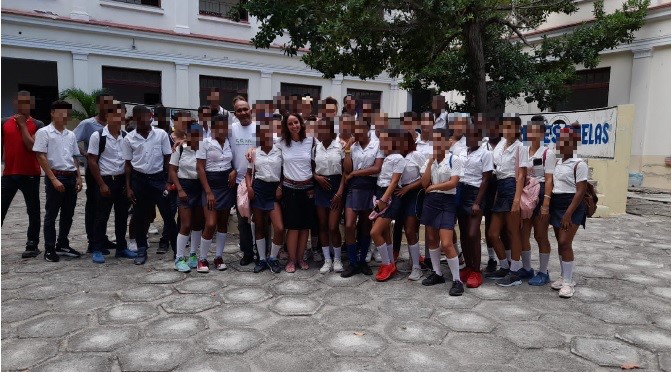Can we help you?
Contact us

Can we help you?
Contact us

Thank you for contacting us
Your form has been submitted successfully Our team will contact you again as soon as possible.
Whooppss...!! An error has occurred
Try sending later or write an email directly to areaempresas@ua.es

INFO
SHEET
DOWNLOAD
EXECUTIVE
ABSTRACT
CONTACT DETAILS: Research Results Transfer Office-OTRI
University of Alicante
Tel.: +34 96 590 99 59
Email: areaempresas@ua.es
http://innoua.ua.es
The Advances in Transcultural Education for Adaptive Transformation research group at the University of Alicante has developed software, hereafter referred to as REACT, which offers innovative tools for reconciliation and social resilience in vulnerable contexts. In this way, it improves equity, social cohesion and teacher training with adaptive educational methodologies and emerging technologies.
The group is looking for public or private entities from the education, cooperation or social innovation sectors that are looking to apply new approaches in their projects with vulnerable groups at risk of social exclusion or that want to collaborate in adapting REACT to apply it to other sectors and educational contexts.

In a world marked by growing inequalities, conflicts and migratory flows, education systems face the urgent challenge of adapting to culturally diverse and socially vulnerable contexts. According to UNESCO (2023), more than 250 million children live in environments affected by violence or exclusion, and access to inclusive, quality education remains a global debt.
The research group responds to this need through innovative educational interventions designed to strengthen reconciliation and social resilience. Unlike conventional models, REACT integrates active methodologies, digital tools and evidence-based cross-cultural approaches, transforming teaching practices and improving educational equity.
This tool also provides scalable solutions that can be adapted to different cultural environments, optimising continuous teacher training and favouring the integral development of students at risk of exclusion. Thus, REACT is positioned as a key tool for governments, NGOs and educational centres seeking to innovate in training and looking to achieve a sustainable social impact.
REACT is an interactive and adaptive educational software, currently in the design phase, which aims to provide accessible and effective pedagogical tools for education professionals working in culturally and socially diverse environments. The development combines scientific evidence, participatory methodologies and results from international comparative studies.
The software is designed to include:
• Training modules for teachers, focusing on socio-emotional competencies, classroom management, intercultural education and conflict prevention.
• Contextual diagnostic tools, which allow pedagogical strategies to be adapted to the characteristics of the students and the environment.
• Interactive resources and customisable pedagogical activities, inspired by approaches based on art, music, dialogue and cooperation.
• Monitoring and impact assessment mechanisms to guide decision-making in educational processes.
Although the product is not yet finalised, the design of its functionalities is being progressively validated through field studies and pilots in collaboration with educational centres in Spain, Colombia, Cuba, Moldova and Thailand.
The ultimate goal is for REACT to be an accessible, multi-platform and multilingual digital resource that can be easily integrated into hybrid learning environments, strengthening the role of the school as a space for social transformation and community resilience.
ADVANTAGES OF THE TECHNOLOGY
• Cost savings in teacher training: By offering digitally accessible continuous training, it significantly reduces the need for travel and face-to-face training.
• Time savings in pedagogical planning: Provides ready-to-use and adaptable educational resources, facilitating teaching programming in complex environments.
• Optimisation of resources by means of accessible educational technology: Compatible with low-cost mobile devices and environments with limited connectivity.
• Ease of use and implementation: Intuitive, multilingual interface designed for users with different levels of digital competence.
• Educational and social impact: Promotes inclusion, social cohesion and well-being of students at risk of exclusion.
• Comprehensive teacher development: Simultaneously improves teachers' pedagogical and socio-emotional skills.
INNOVATIVE ASPECTS OF THE TECHNOLOGY
1) Dynamic Pedagogical Adaptation
• Innovation: REACT technology offers a unique ability to adapt and customise educational methodologies to diverse multicultural and cross-cultural contexts, responding to the particular needs of each classroom and community.
• Added Value: Facilitates the creation of learning experiences that respect and promote cultural differences, contributing to social inclusion and mutual respect.
2) Integration of Emerging Technologies
• Innovation: Incorporates emerging tools such as augmented reality (AR) and artificial intelligence (AI) to customize teacher training and improve interaction with students.
• Added value: Enhances immersive learning, increasing engagement and retention of educational content.
3) Continuous and Adaptive Assessment Platform
• Innovation: REACT includes data-driven continuous assessment systems, allowing teachers to monitor student progress in real time and adjust pedagogical methodologies instantaneously.
• Added value: Optimises teaching-learning processes and promotes constant improvement in real time.
4) Innovative Pedagogical Approaches for Social Cohesion
• Innovation: Implements innovative pedagogical approaches such as project-based learning and participatory methodologies, especially designed to address social cohesion in vulnerable contexts.
• Added value: Encourages the social integration of students and promotes the development of socio-emotional competences essential for their well-being and academic success.
5) Teacher Training through Virtual Reality and Simulations
• Innovation: The incorporation of simulations and immersive experiences through virtual reality (VR) allows teachers to practice real situations in controlled environments, improving their pedagogical competences in diverse scenarios.
• Added value: It offers a more effective and attractive form of continuous training, without the costs associated with face-to-face training.
6) Comparative and Intercultural Approach to Good Teaching Practices
• Innovation: The group conducts comparative research across different cultural contexts on best teaching practices, promoting the exchange of effective strategies adapted to each environment.
• Added value: Facilitates the continuous improvement of teachers through the incorporation of successful experiences from different countries and cultures.
7) Promoting Educational Equity with Inclusive Tools
• Innovation: The technology incorporates inclusive tools designed to support students at risk of social exclusion, with an emphasis on educational equity.
• Added value: It offers a direct impact on reducing educational gaps and improving educational quality for all students, regardless of their socio-economic or cultural background.
As mentioned above, REACT educational technology is currently under development within the framework of several publicly funded research projects. These projects explore innovative strategies to improve inclusion, social cohesion and well-being in vulnerable and cross-cultural educational contexts.
The REACT technology is currently undergoing empirical collection and effectiveness evaluation, using tools such as the University of Alicante (UA) Moodle platform and the micro-credentials system. These tools are making it possible to evaluate the impact and effectiveness of the educational methodologies implemented. The evaluation phase is being carried out in several countries, including Cuba, Moldova, Poland, Lithuania, Italy, Thailand, Finland, Colombia, Portugal, Canada, the Czech Republic, China and Nepal.
On the other hand, the research group has several active projects such as a European, a national and a regional one, including a proposal submitted to the last edition of the ERC (European Research Council) that was close to being selected. All this reflects the effort to broaden and diversify the sources of funding and collaboration in order to generate innovative educational solutions that promote inclusion, equity and social resilience at a global level.
Once sufficient empirical data is obtained to support the effectiveness of the methodologies, the educational software will be distributed on a not-for-profit basis to support teacher training and promote adaptive teaching in diverse contexts globally.
REACT technology has a clear focus on the education sector, but its impact goes beyond the classroom, with a direct reach into various areas of society. Some of the key sectors where the technology can be applied include:
• Education: REACT's main application is in the education sector, improving teaching methodologies and teacher training in multicultural and cross-cultural contexts. Its innovative approach seeks to strengthen inclusion and equity, especially in vulnerable contexts.
• Social Services: The impact of technology in vulnerable communities, especially in relation to child protection, social integration and equity, makes it a valuable tool for improving social and community services
• Community Development: REACT acts as a driver of positive social transformation, empowering educational communities and strengthening the social fabric, contributing to resilience and social cohesion.
• Mental Health and Wellbeing: Through improving the socio-emotional competencies of teachers and fostering a positive educational environment, technology also has an impact on the psychological and emotional wellbeing of both educators and students.
• Information and Communication Technologies (ICTs): REACT relies on the use of digital platforms, virtual tools and emerging technologies to promote more accessible, adapted and flexible learning in diverse educational environments.
• Social Sustainability: Given its focus on equity, inclusion and improving conditions in multicultural contexts, REACT has a strong link to creating a more just and resilient society, encompassing various sectors related to social sustainability.
In short, REACT is not only limited to the field of education, but has a broader impact on social development, child protection and community well-being, and is a key tool to foster positive social transformation globally.
As part of the development and expansion of REACT technology, strategic collaboration is being sought with international partners who share an interest in improving education and contributing to positive social change. The types of collaboration being sought include:
• R&D project agreement (technical cooperation): This collaboration aims to finalise the development of the REACT technology, as well as to adapt and apply it to other educational sectors and contexts. The technology aims to be an inclusive tool that can be adapted to diverse multicultural realities, so the support of research centres and universities is required to carry out further studies, evaluate its impact and improve the educational methodology.
• Research cooperation agreement: The aim is to work with universities and research centres in the collection of empirical data, field tests and proofs of concept to validate the effectiveness of the methodologies implemented through REACT, especially in vulnerable areas and contexts of social risk.
• Technology distribution agreement with technical assistance provided: The idea is to expand the reach of the educational tool, creating an accessible resource with global impact. In this sense, alliances are sought with educational technology companies to facilitate the distribution of the software and provide technical assistance to the institutions that adopt it.
• Outsourcing agreement (training, maintenance, etc.): In particular, partners are being sought to provide ongoing training of teachers in REACT's innovative methodologies, as well as maintenance and updating of the educational platform that supports the technology.
Partner Profile Sought
• Universities and Research Centres: Partnerships are sought with prestigious universities and research centres that can contribute to the development of innovative educational methodologies, research and validation of the effectiveness of REACT technology and its adaptation to multicultural educational contexts.
• Educational institutions: Partnerships with schools, universities and other educational institutions, especially in countries with vulnerable contexts, are key to implementing these methodologies at the classroom level. These partners would be instrumental in ensuring that educational solutions are accessible and relevant to local environments.
• Non-profit organisations and NGOs: Given the social focus of the technology, collaboration is sought with organisations working in areas such as child protection, social inclusion and community development, to expand the positive impact of REACT in vulnerable communities.
Ultimately, current and future collaborations allow for the expansion of REACT's reach, ensuring its long-term sustainability and global applicability.
The REACT software is protected by copyright and is under continuous development.
The product will be free of use, with the aim of being adopted by educational communities around the world, especially those facing social, cultural and economic challenges. The REACT software will thus become a vehicle for promoting education that is not only more inclusive, but also promotes positive social change, focusing on comprehensive child protection and strengthening the social fabric through education.
Carretera San Vicente del Raspeig s/n - 03690 San Vicente del Raspeig - Alicante
Tel.: (+34) 965 90 9959




